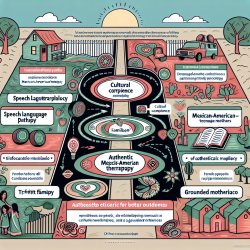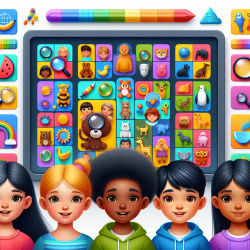Introduction
In the realm of speech-language pathology and online therapy services, understanding the cultural and lived experiences of diverse populations is crucial for effective practice. The research article "Mexican American Adolescent Mothers’ Lived Experience: Grounded Ethnicity and Authentic Mothering" provides valuable insights into the unique experiences of second-generation Mexican American adolescent mothers. This blog post explores how practitioners can apply these findings to improve outcomes for young mothers and their children.
Key Findings
The study highlights two major themes in the lived experiences of Mexican American adolescent mothers:
- Grounded Ethnicity: A strong desire to remain true to their Mexican heritage, which includes valuing family (familismo) and maintaining cultural traditions.
- Authentic Mothering: A profound relationality with their infants, characterized by a deep attachment and commitment to their children's well-being.
Implications for Practitioners
Understanding these themes can guide practitioners in creating culturally congruent services that respect and support the unique identities of Mexican American adolescent mothers. Here are some actionable steps:
- Respect Cultural Identity: Acknowledge and incorporate the mothers' cultural values and traditions into therapy sessions. This can help build trust and rapport.
- Promote Familismo: Encourage family involvement in therapy, recognizing the importance of family support in the mothers' lives.
- Enhance Self-Efficacy: Empower young mothers by focusing on their strengths and capabilities, rather than deficits.
- Reduce Stigmatization: Address and challenge stereotypes about adolescent mothers, fostering a more supportive and understanding environment.
Encouraging Further Research
While this study provides a foundation, further research is needed to explore the long-term impacts of culturally tailored interventions on the development and well-being of Mexican American adolescent mothers and their children. Practitioners are encouraged to engage in research that examines the effectiveness of culturally congruent therapeutic approaches.
Conclusion
By integrating the findings from this study into practice, speech-language pathologists and online therapy providers like TinyEYE can better support Mexican American adolescent mothers. This approach not only enhances therapeutic outcomes but also contributes to the broader goal of reducing health disparities and promoting equity in healthcare.
To read the original research paper, please follow this link: Mexican American Adolescent Mothers’ Lived Experience: Grounded Ethnicity and Authentic Mothering.










